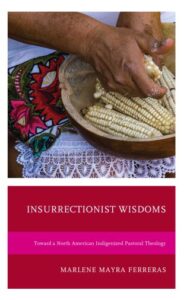– 2023 HTI Book Prize Recipient –
In this beautiful and thought-provoking volume, Marlene M. Ferreras, builds a bridge from the academy to a small rural town in Yucatán, México.
Ferreras’ qualitative research project involves interviewing eleven Maya women working on the assembly line of a transnational corporation with the aim of uncovering the strategies and wisdoms the women use to promote life in the dehumanizing and death-dealing context of factory work Ferreras aims to contribute “to the development of pastoral care through the privileging of non-Western thought and practice” (5).
The first chapter draws on decolonial thinkers to understand the global economic systems that brought a multinational textile corporation (maquila) into a small rural town of Indigenous people, as well as the intertwined problems of neoliberal capitalism, sexism, and racism. The second chapter presents five strategies that the maquilas use to subjugate workers. The third chapter explains how the Mayan women’s ancestral spirituality fosters a self-understanding that is connected to the ecosystem and focused on bringing life. The wide-ranging fourth chapter guides a conversation among Christian feminist theology, ancient Mayan texts, decolonial theorists, and the women’s experiences in order to identify the women’s strategies of resistance that serve as practices to sustain hope. The final chapter explains the relevance of this project to the wider discipline and suggests future areas of research.
This very readable text is useful for seminary graduate students and professionals in the fields of practical theology and pastoral counseling. Ferreras is explicit in presenting a methodology for conducting practical theology field research in non-Western contexts, and she demonstrates uncommon transparency in describing the ups and downs of the investigation.
Ferreras models the humility of entering a research context willing to listen, as well as the flexibility to abandon preconceived theological agendas when it is clear they do not apply. She openly admits that her expectations for research were not met. Ferreras began her project expecting to find the Mayan women engaged in the type of communal bible readings common in Liberation Theology base communities. She quickly realized, however, that the women consider their local Catholic church largely irrelevant. They explained to her that a church that did not support them in their struggles at the maquila was not a useful resource for them in their efforts to provide for their families and sustain their community.
Ferreras invites the reader into her experiences living in the town and interacting with the community, and she shares her own process of coming to understand the situation. This occasioned something of a conversion experience for Ferreras as she realized that the theology that informed her personal practices and professional trajectory as a Southern Californian, Seventh-day Adventist was simply not a motivating factor in this new context. In letting go of her theological agenda and its corresponding worldview and language, Ferreras allows the women to explain how their ancestral practices, their dedication to their land and community, and their desire to provide for their children sustain them and provide hope for the future.
Ferreras prominently features the women’s own words – written in Spanish with translations at the bottom of the page. While this choice might cause a healthy friction for some monolingual English readers, it models Ferreras’ approach to spiritual caregiving as these women have the ability to accurately assess their situation and the wisdom to imagine a better future. The women’s words prove that an incisive analysis of their situation does not require academic jargon or professional expertise; rather, their intelligence is grounded in their sense of identity as mothers and as members of a community that has been in relation to the land for many generations. For Ferreras, this is a crucial point for “spiritual caregivers [as they offer] practices of care with working-class women of color and other marginalized communities” (xvi).
Finally, Ferreras’ analysis of the economic context and the constructive theological contributions are interwoven with a more personal narrative. She recognizes a kinship with the Mayan women as she recalls her own family history. As Cuban immigrants to the United States, her mother and aunts worked on assembly lines and suffered from the lack of appropriate compensation and health care for injuries sustained on the job. Ferreras’ heartfelt descriptions are always attentive to the ways in which working-class women are linked transnationally. In one particularly poignant example, the small acts of resistance of the Mayan women – allowing imperfect garments to pass the quality control station so the workers would be paid – enable struggling immigrant families in the U.S. (like the author’s family when she was a child) to purchase irregular clothing at a reduced price. If only for a brief moment, Ferreras reminds us, women’s practices of solidarity can halt the relentless dehumanization of global capitalism.
Digital Theological Library, Universidad Bíblica Latinoamericana




